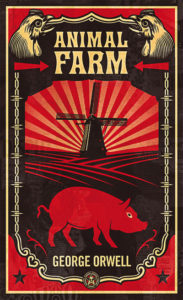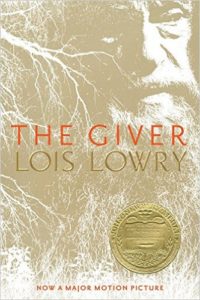8 One-Day Reads for Busy Millennials
By Kim Hufford
Posted on
One of the top reasons I’ve heard for why people don’t read is because they don’t have enough time; they work full-time, have a family, and/or their schedules are otherwise filled up with extracurricular activities. In an effort to guide those who have a desire to read but not the time, I’ve compiled the following list of my top eight books under 200 pages. Feel free to let me know how many you’ve read, or if you have any other suggestions!
Animal Farm
by George Orwell
This was a book I didn’t appreciate until I was older. I remember reading it in high school and thinking, What does this book about talking animals have anything to do with the government? When I read it again at age 30, I had a completely different take-away.
Set on an English farm, Animal Farm focuses on the lives of the animals who live there. After being mistreated and reared as slaves for their whole lives, the animals rebel against their owners and embark on a mission to create progress, justice, and equality. With catchphrases such as “All animals are equal. But some animals are more equal than others” and “Four legs good, two legs bad,” Animal Farm is a clear satire of the Russian Communist system in place during its production. Over the years, it can easily be dropped into just about any political environment throughout history.
*Also check out 1984 by George Orwell.
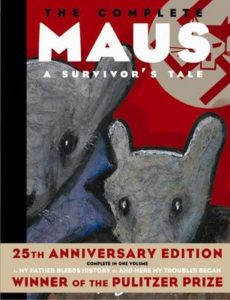 Maus & Maus II
Maus & Maus II
by Art Spiegelman
Okay, I’m cheating here. These books can either be purchased separately or together (for a combined page count of 295). Both come in under 200 pages and are an easy read.
Art Spiegelman created Maus I and Maus II to tell his parents’ story of surviving World War II. Before you decide that you’re tired of seeing Holocaust stories, consider this: the Maus collection is told in comic form. The protagonist of the story, Vladek Spiegelman, is portrayed as a mouse, while other characters, such as Hitler’s army, take on such roles as cats and pigs—the implications are obvious and intentional. What makes this story truly unique is that Spiegelman tells it through the eyes of his father, but as himself. Let me explain: throughout the story, Spiegelman is portrayed talking to his father about his experiences, and this is where we see Vladek’s true self—how the war effected every single aspect of his life, even after all those years. Because of this viewpoint, we also get to see how Vladek’s past helped shape the person the author ultimately became.
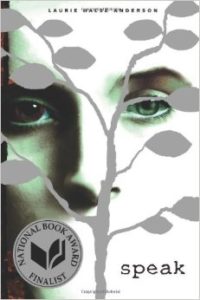 Speak
Speak
by Laurie Halse Anderson
One of the most disappointing assumptions about literature is that adults can’t read below their age group. With that mentality, they miss out on so many truly wonderful stories Laurie Halse Anderon’s Speak, which, although intended for a young adult audience, is certainly a must-read for all age groups.
Melinda is an outcast as a freshman at Merryweather High School. She takes solace in her art, where she feels free to be herself and to truly express herself. It is through her art that she is finally able to come to terms with a violent incident during an end-of-summer party that led to police action. Melinda was raped by an upperclassman who still attends her school; after the initial incident, she is even more of an outcast and shunned by her fellow students. She is silenced. But, after another violent encounter with this same boy, Melinda speaks up, and sets out on a journey of vindication and justice that teaches everyone who reads her story to Speak.
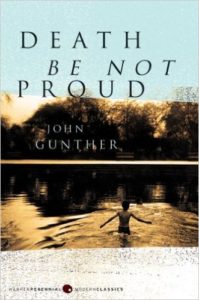 Death Be Not Proud
Death Be Not Proud
by John Gunther
Death Be Not Proud finds John Gunther telling the story of his son Johnny’s struggle and ultimate death from a malignant brain tumor at the age of seventeen. Told through the eyes of Gunther and his wife, Frances, we are shown the unending love of two parents who struggle to keep their son comfortable and happy during the last months of his life. Extraordinarily bright, Johnny maintains his sense of humor and his desire for learning throughout the book, achieving a seemingly impossible feat: graduating from high school. Shortly after his graduation, Johnny dies from the ailment, leaving two devastated, but incredibly proud parents in his wake.
Another book seemingly intended for young readers, The Giver has remained one of my favorites. I first read it for school in sixth grade and remember being enthralled by it. Years later, it was the first book I got my mother to read with me (she is not generally a reader), and I was delighted to see her eagerly wait for me to finish it again so she could talk to me about it. Frankly, I have never met a person who did not love this book.
Jonas’s world thrives on sameness. Lacking colors, spontaneity, and any form of true emotions, there isn’t a lot of room to be who you are. At the age of twelve, every child in the community is assigned a job that they will do for the rest of their lives. Jonas watches as all of his friends receive their assignments as he is skipped over. After the ceremony, Jonas is told that he has been selected to be the community’s Receiver of Memory, the highest honor. As he embarks on his new journey, he begins to understand the secrets behind his community’s seemingly perfect structure, and questions everything he has been trained to believe.
*The Giver is the first in a series of four books, but can be read and enjoyed on its own.
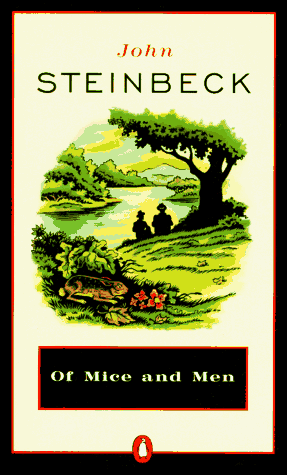 Of Mice and Men
Of Mice and Men
by John Steinbeck
George and Lennie have nothing in the world except each other. With a dream to own their own land, the two set out to find work, which leads them to a ranch in California. Simple-minded Lennie unintentionally makes things difficult for them when he falls victims to his own innocence and strength. Spending much of his time and energy defending and protecting Lennie, George eventually makes a difficult and heartbreaking decision in an effort to protect them, as well as everyone else on the ranch.
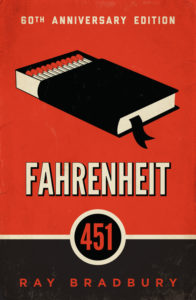 Fahrenheit 451
Fahrenheit 451
by Ray Bradbury
Yes, I saved the best for last.
There’s something about a book that is so unbelievable that it’s believable. Fahrenheit 451 is set in an unspecified future in which books have become illegal. Firefighters no longer put out fires, but start them. Whenever forbidden books are found, they are burned, but the want for knowledge cannot be quelled. Guy Montag finds his standing as a respected firefighter being questioned when a series of events bring the fire department to his very own house. Painting a beautiful and terrifying picture of a world where ideas and curiosity are frowned upon, Fahrenheit 451 makes us all question how far away from this reality we actually are.
*Also see Tim Hamilton’s graphic novel interpretation.
